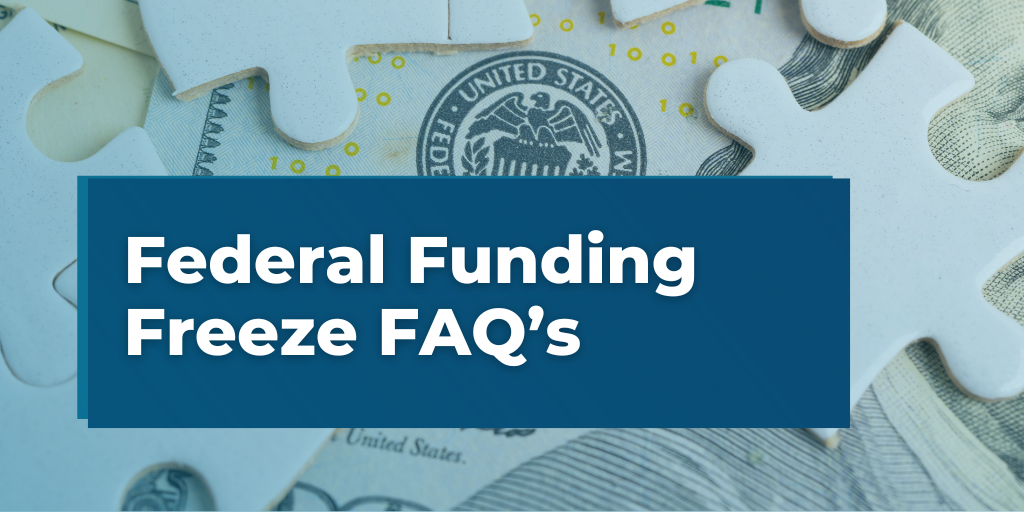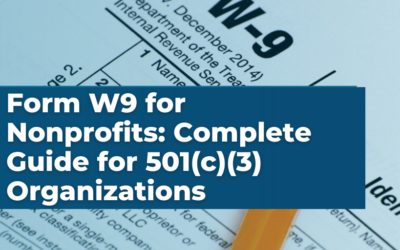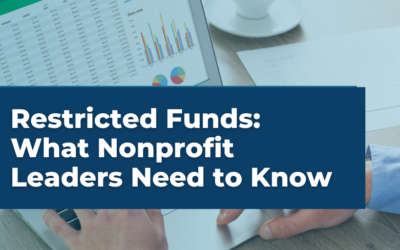2025 Federal Funding FAQ’s
As federal policies continue to evolve, nonprofit organizations must stay informed about executive actions that may impact their operations, funding, and compliance requirements. Whether or not your nonprofit receives federal funding, it is essential to understand how these changes could affect your organization’s ability to operate effectively and maintain its tax-exempt status.
Below, we answer some key questions about recent executive actions and what they mean for nonprofits.
1. Do Executive Actions Affect Nonprofits That Don’t Receive Federal Funding?
Yes. While some executive directives specifically relate to federal funds, the federal government has the authority to enforce new directives on all entities that are required to follow federal laws, including 501(c)(3) organizations. Even if your nonprofit does not directly receive federal funding, executive actions can still have a significant impact on your compliance requirements, reporting obligations, and operational strategies.
2. What If My Nonprofit Receives Federal Funds But Doesn’t Use Them for Prohibited Activities?
Even if your organization does not use federal funds for activities deemed prohibited under new executive orders, your funding may still be at risk. Many of the recent executive actions propose withdrawing federal support from organizations based on their overall activities, regardless of whether federal dollars are directly funding those activities. This means that nonprofits must be vigilant about new policies that could impose restrictions or conditions on grant funding, contracts, or other government assistance.
3. Can the Federal Government Cancel My Contract or Grant Due to Executive Orders?
Federal agencies have broad discretion to cancel or modify grants and contracts based on new policies and directives. The ability to terminate funding depends on specific grant and contract terms, agency procedures, and federal regulations. It is important to review all contract terms carefully and be prepared for potential changes in funding eligibility.
4. How Will Executive Actions Impact Diversity, Equity, and Inclusion (DEI) Initiatives?
There have been executive orders specifically targeting DEI programs, with directives aimed at eliminating DEI-based funding, contracts, and training programs. Nonprofits engaged in DEI-related work may see grants and contracts revoked or modified. Additionally, federal agencies may change their grant requirements, removing or redefining DEI-related funding provisions. Organizations should conduct risk assessments and closely monitor policy changes that could affect their DEI initiatives.
5. Should My Nonprofit Adjust Its DEI Efforts?
Given the shifting regulatory landscape, nonprofits should carefully evaluate their DEI initiatives and consider how executive orders may affect them. Legal challenges to these executive orders are ongoing, and federal agencies will provide further guidance on what activities are permissible. Nonprofits should engage with legal counsel and stakeholders to determine their level of risk and compliance strategy. It is also crucial to develop a communications plan to address any changes in DEI programming with donors, staff, and the community.
6. Can My Nonprofit Lose Its 501(c)(3) Status Due to DEI Activities?
The IRS has the authority to revoke 501(c)(3) status for organizations that engage in illegal activities or violate public policy. While the application of this authority to DEI programs is still unclear, nonprofits should be cautious and stay updated on legal rulings and federal guidance. The best course of action is to regularly review compliance policies and document all activities to ensure alignment with evolving regulations.
Visit the IRS for the latest nonprofit tax-exempt regulations.
7. Will My Nonprofit Be Investigated Due to Federal Funding Reviews?
The current administration has instructed federal agencies to review funding for nongovernmental organizations, including large nonprofits, foundations, and educational institutions. These reviews may lead to increased scrutiny, compliance investigations, or new funding restrictions. Organizations should proactively assess their financial structures, document programmatic compliance, and seek legal counsel if necessary.
8. What Steps Should My Nonprofit Take to Mitigate Risk?
To safeguard your organization from potential funding loss or compliance challenges, consider the following steps:
- Review Existing Grants and Contracts: Ensure you fully understand the terms and conditions of your federal funding.
- Diversify Revenue Streams: Reduce reliance on federal funding by seeking private grants, earned revenue, corporate sponsorships, and community-based fundraising.
- Stay Informed: Monitor updates from nonprofit associations, legal advisors, and policy experts to stay ahead of regulatory changes.
- Conduct Risk Assessments: Evaluate potential vulnerabilities in your funding, compliance, and program operations.
- Strengthen Compliance Practices: Ensure all activities align with applicable federal laws and IRS regulations.
- Engage Stakeholders: Communicate proactively with board members, staff, donors, and partners about potential policy changes and their implications.
9. How Can Nonprofits Stay Up to Date on Executive Actions?
The nonprofit sector is constantly evolving, and staying informed is critical. Here are a few ways to keep up with policy changes:
- Subscribe to Policy Newsletters: Organizations such as the National Council of Nonprofits provide regular updates on federal actions affecting the sector.
- Attend Webinars and Trainings: Many legal and nonprofit advocacy groups host events on emerging regulatory issues.
- Consult Legal Experts: Work with legal professionals specializing in nonprofit compliance to navigate complex policy changes. Find a lawyer through the American Bar Association (ABA).
- Check Government Websites: Agencies such as the IRS, Department of Justice, and Office of Management and Budget (OMB) regularly release updates on federal policies impacting nonprofits.
Conclusion
Executive actions can have far-reaching implications for nonprofit organizations, even those not directly receiving federal funding. By staying informed, conducting risk assessments, and diversifying revenue sources, nonprofits can navigate these changes while continuing to fulfill their missions. It is essential to remain proactive, engage legal counsel when necessary, and communicate effectively with stakeholders to ensure financial sustainability and compliance in an evolving regulatory landscape.
If you have questions or need assistance, consider reaching out to nonprofit advocacy groups or legal advisors to ensure your organization remains prepared for upcoming policy changes.





